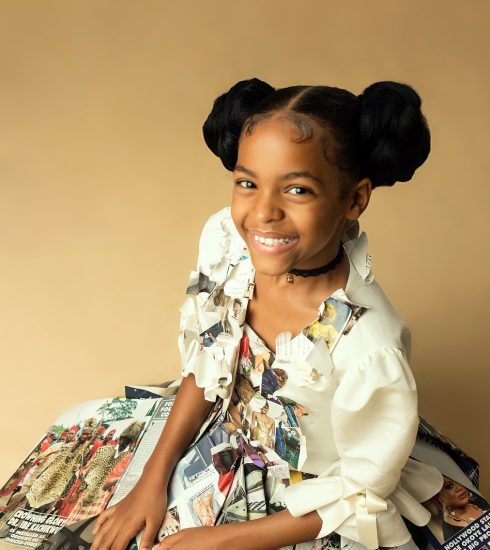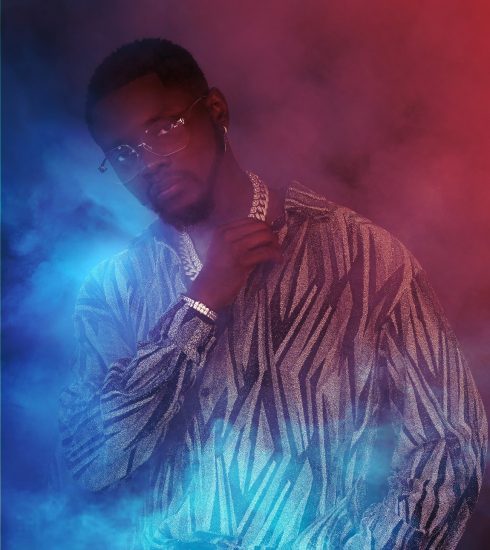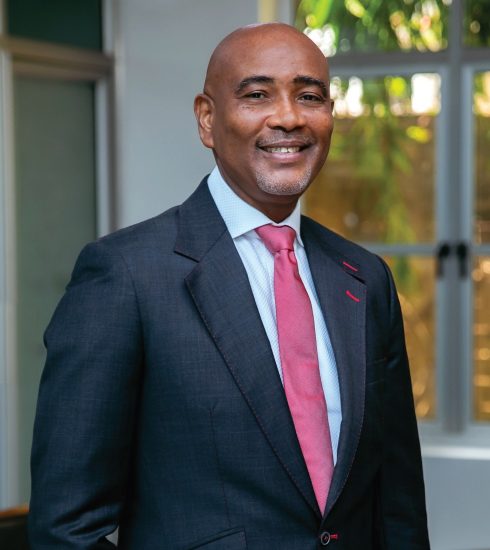Shaffy Bello: Nollywood Royalty
Several notable figures in Nigerian cinema have shaped the field for many years, contributing to Nollywood’s development into what it is today.
Both in acting and film production, these industry legends have devoted their lives to advancing their respective fields. They have helped Nollywood become known internationally for their devotion, and their efforts have established high standards for aspiring performers and filmmakers to follow. Their perseverance, imagination, and hard work have paved the path for the next generation to succeed in an industry that is always evolving.
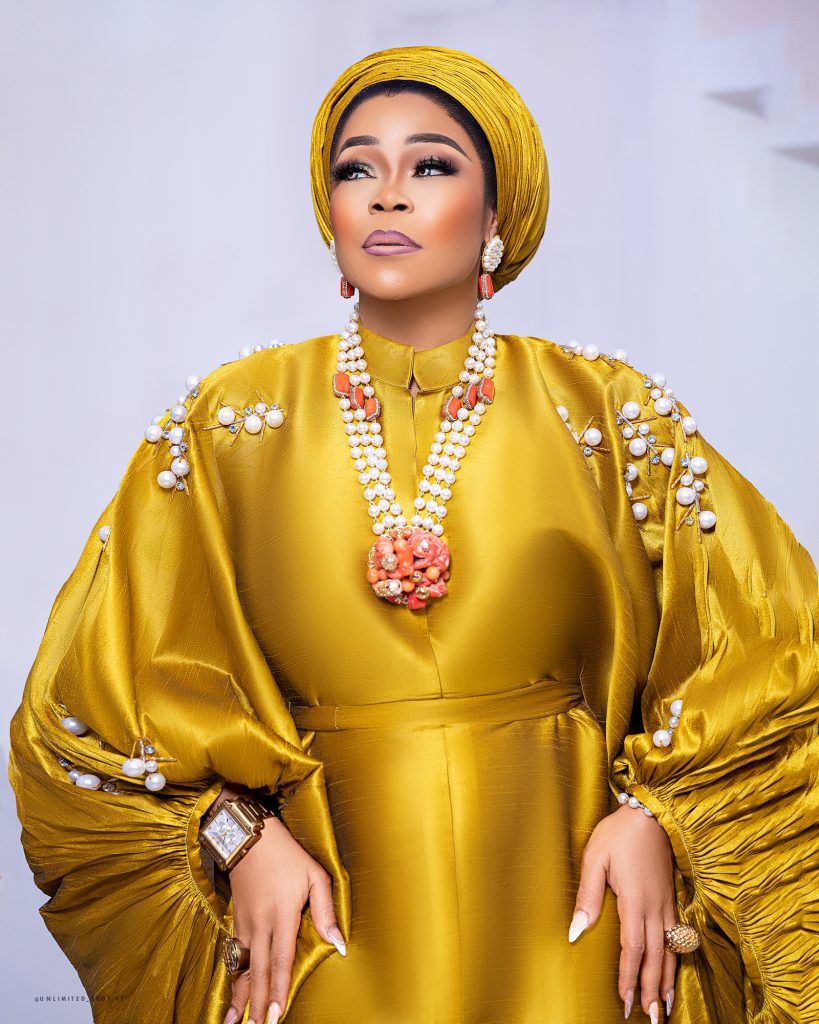
Shaffy Bello, an actor and singer who first gained popularity in the entertainment industry for her vocals on Seyi Sodimu’s 1997 hit song Love Me Jeje, is one of these remarkable figures. After growing up in the US, Shaffy moved back to Nigeria, where she made her Nollywood debut in the Yoruba movie Eti Keta. She has acted in many English and Yoruba movies throughout the years, in addition to wellknown TV shows, including Taste of Love and Tinsel.
Shaffy is well-known for her adaptability and has successfully juggled acting and music, making a name for herself in both fields. Many young actors still find inspiration in her work as they look up to her as an example of longevity, success, and excellence.
In this interview with THEWILL DOWNTOWN’s Dorcas Akintoye, Shaffy Bello talks about her experience in Nollywood, her sense of style, how she manages to stay true to herself in an evolving field, and her strategies for staying relevant over the years.
You’ve had an incredible journey as an actress. What inspired you to make the leap from music to acting?
I believe very much that whatever it is that you’re set upon this earth to do comes to you. And if you’re very aware, you recognise it and latch onto it. What I have done over the years is to be sensitive to things around me. I was sensitive to the fact that there was an opening there. I had a yearning for it. When I came to Nigeria, musically that career for me, had gone into a coma. Let me not say died. It had gone into a coma. So when I got back to Nigeria, I wanted it because I had acted in two films in the U.S. before I came.
I knew very much that I loved it. I had also been doing some stage plays and things like that in the U.S. before coming, so I knew I loved it. So, coming here, I wanted to, but I didn’t know what direction to take. But when you’re sensitive to a higher power, it just leads and guides you. So it wasn’t a matter of saying this is what I wanted to do. The universe opened the door to me. And I just walked right into it. And it was my set time.
Your first major film was Eti Keta, a Yoruba film. What was the experience like working on that set?
It was quite interesting because, having played a few roles in the States, things were a bit different. Some things were familiar, though, but it was a Yoruba set. So, as you can imagine, things were not the same, and this was years ago. So things were not the same as it is today. Now, keep in mind that, at that time, that story had already been told. I met Saheed Balogun, and we just launched into it. He looked at me and was like, I’ve finished this film, but I wish you were in it, and he created a space.
That’s what I mean by when the universe, when God says it’s time, He just opens the door. A film that was already completed, and then the producer goes, you know what? I would change the story, intertwine it, and put you in it. That was an opportunity that God opened up for me. It was great. I felt like it was a great opportunity. So, if anything was going on that was not even up to par for me, I scaled through it. Because I saw an opportunity, I didn’t see anything else. So I launched into it. Thankfully, it was a great venture because that film became a huge cinematic film. This was when cinema wasn’t doing great; it wasn’t the way it is now, but surprisingly, that film did exceptionally well in the theatres. He did a huge premiere. And, yeah, it was a great experience.
Looking back at your career, what has been the most challenging role you’ve ever taken on?
I think it would be Iyaloja in Eleshin Oba, The King’s Horseman. That was the most challenging role. And I’ll tell you why. It wasn’t because it was an indigenous film. That, for me, was challenging, because this was a Pulitzer Prize winner, Professor Wole Soyinka’s film. And then, of course, it was produced by Ebony Studios. It was challenging, more so because of the language barrier. I could speak Yoruba, but indigenous Yoruba was another challenge. So I had to have a coach. And so playing that role, it wasn’t even just getting in the role itself and into character. That wasn’t the only problem. It was a language problem. So I had to study. I must say, throughout my career, that’s been the most challenging role.
Because it took a lot of work. A lot of work, I must say. But I welcomed the challenge. And I still do to this day. Characters like that show people how versatile an actor is. And I often wanted to let people see how versatile I am as an actor. And that proved it. And it opened so many other doors for me.
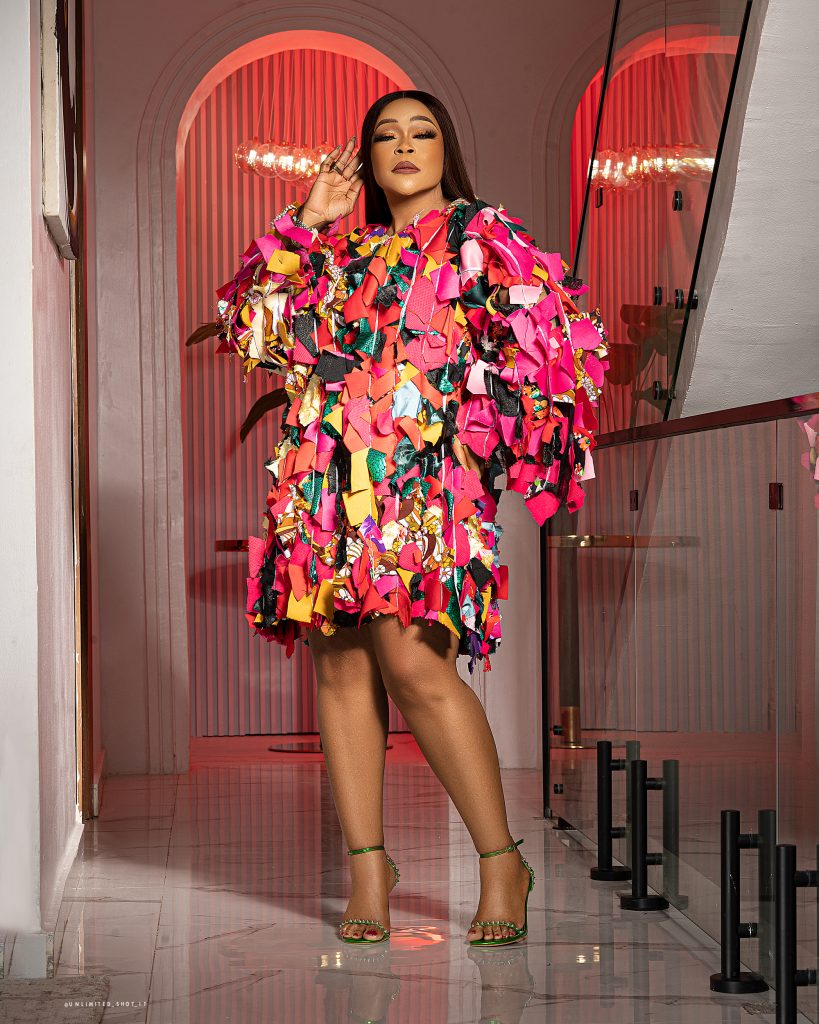
How do you prepare mentally and emotionally for the intense role that you play?
For me, I’ve often said being called an actor is not something that I like. But, of course, it’s an internationally known word to use. I often say I love being called a becomer because I always say that once the camera goes on and we hear action, if you’re acting, then you’ve failed. You should become the character.
Even after reading a script once or twice to get into character. I’m not going to lie, there are some scripts you read and it’s very easy to become because it’s just second nature. You’ve played such characters over and over again. It’s not a big deal anymore. But I still read some and still find it a little bit difficult. I did a film recently, The Masked King, and I had to play a queen in Calabar and it was in the colonial days, Mary Slessor days. The film should be out very soon. And in that film, I had to speak a little bit of Calabar here and there. I had to be very indigenous to the people. So, to achieve that, I went back and studied some of the nuances, how they are, and who they are as a people. Calabar people are very calm. I would look through the people while we’re on set. I would just, you know, watch the women. See the way their nuances and things like that. So you study, and that’s how you become. You study why they are who they are or why that character is who she is.
I gave a class recently to some actors. And I was telling them that it’s very important to have a character bible of the character you’re about to play. When she’s angry, if she’s an angry character all the time, you want to ask, why is she angry? And then, if you look back, you probably find out or give that character a story. It helps to define the reason why a character is like that. Because we’re only human, when we’re playing these characters, we’re playing real people. When the writer sat down to write the character, there was a reason behind every character and their nuances. Why are they angry? Why are they always happy? Why are they confused? Why do they want to be married? Why do they want children so badly and they are doing whatever it takes? There is a reason behind everything. So, if you know the reason behind why a character is who they are, and you give yourself that story, it makes it easier. But to put it in a short word, you study hard.
What’s that one role you’ve played that you feel is kind of closer to your real personality?
I don’t think I’ve played any role that I feel is me. Maybe I can say Adora in Battleground was more, without the story of her life, the way she lives, the way she thinks. Adora is a well-travelled character. She spoke well. It was very much easier. It was easier to play Adora. But emotionally, Adora is a different person than I am. But in terms of the nuances of the character and how she spoke, I didn’t have to tone down anything with Adora. So I think I’ve played so many characters like that, but I would say Adora from Battleground.
Are there any characters or roles that you would like to play in the future that you haven’t had the chance to yet?
There are so many roles. I often say as an actor, I am pregnant, and I just need to deliver. I use that all the time to just tell people how I feel. Every actor always wants to show forth their versatility in them. There are many characters that I would love to play. For example, Chief Daddy in The Black Book was also a character that I loved playing because there was nothing about her that you could fish out, she’s still evolving. So, is there any character that I would still love to play? So many more. Do you know that character in The Devil Wears Prada? That woman. That would be a character that I would love to play. I think she would be fun to play.
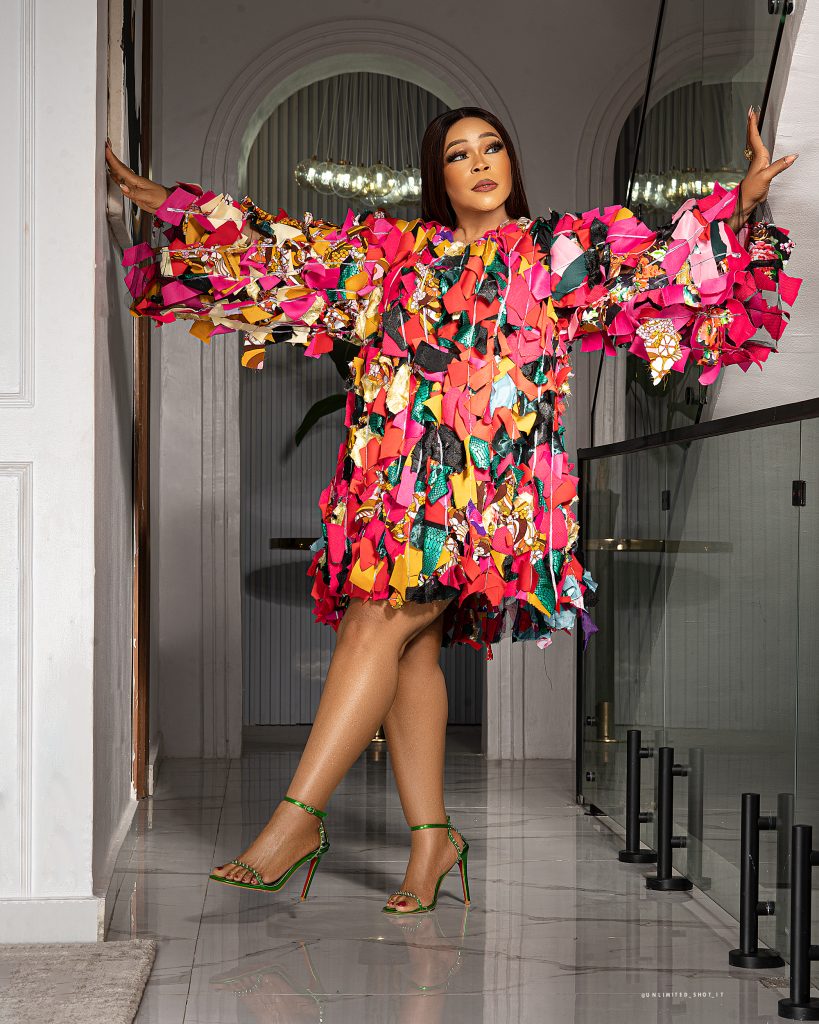
As someone who has worked in both music and acting, what similarities and differences do you find in expressing yourself through these two art forms?
I think they’re both the same. I don’t see any difference in acting and music. I’m not talking about the technical aspect of it. In this one, you’re singing. In this one, you’re playing a role. Both of them come with you being very true to yourself.
As a singer, you have to be true to yourself in telling stories. And you find that when you look at a musician like Asake, he tells his story. You can tell from his music and his background what moulded him. With Davido, when you listen to his music, you can tell that these are stories that mean a lot. So what it is, is when they get the songs or when they write the songs, the story itself tells who the artist is. It’s the same thing as an actor. When you see an actor perform, the performance ought to tell you who that character is. So the difference between an actor is an actor is not bringing himself or herself into that character, whereas a singer has to be singing about themselves and what’s going on in their environment all the time. It’s still a form of entertainment. Both of them are forms of entertainment; first of all, they’re both entertaining, but to be successful in both of them, you have to be true to yourself. For me, a lot of times, people who do not truly know who they are; they are confused. And when you’re confused and you don’t know who you are, it becomes a problem for you to even tell a story.
When you know who you are, you put that aside and you tell a story. As a singer, you tell a story of who you are and who you’re not. Asake can sing about the wealthy life because now he has lived it. In the beginning, he didn’t because he hadn’t lived it. So it’s very difficult to see a singer who is suffering, who you can tell hasn’t made it in the career, to talk about “money, money, money, we dey spend am, e plenty, e plenty”. It’s very hard to connect with that person. Do you see where I’m going with that? So it’s very hard to connect with that singer. But when a singer sings about the trenches, because that’s where he’s from, it resonates because he can sing it with all his soul. So when an actor also studies the character they’re about to play and puts yourself, you put that down and you go deeper into the story because you know who you are, so this is not telling a story of who you are. This is telling a story of who this character is. So, those are the differences. But the similarity will be knowing who you truly are and living a selfawareness life.
What were the biggest cultural differences you had to adapt to when you returned to Nigeria to pursue your acting career?
Well, there are so many things here that are different from living in the Western world. But please know that, for me, I’ve never been that person that looked down on the way we are and our culture. I took it with me when I went. I lived it over there. I never forgot where I was from. So when I got back here, you didn’t bring what you learned over there. It works for them over here. You get to Nigeria, you adjust. Now, you do not adjust to the things where you lose who you are as a person. Being kind is universal. Being sensitive to other people is universal. The only difference that I see is that sometimes people are not courteous, and that happens all over the world. I don’t think there’s a difference between there and here. It’s just an individual thing. So there are people in Nigeria who are self-aware where they know human relations and space and giving people space. Say maybe we’re in a queue. I don’t want the next person behind me standing so close to me, which they do here. Over there, you will look back and say, excuse me, can you step back a bit? They don’t understand that here. So those are the little things that you see. Not much of a difference. Being human is universal. And I think because I didn’t bring the Western expectation to what I do. There’s a reason why Nollywood has grown to where it is and that’s because Nollywood is peculiar to Nollywood. You can’t take the character of Hollywood and bring it here. It doesn’t work. So, you adjust wherever you are. I often say if you take me now and put me in Angola, I will adjust because it’s not about the things around me. It’s about what is in me. So, I believe that one of the reasons why I did so well was because I just adjusted to the way things are done here. It doesn’t mean they’re bad. It just means they’re different.
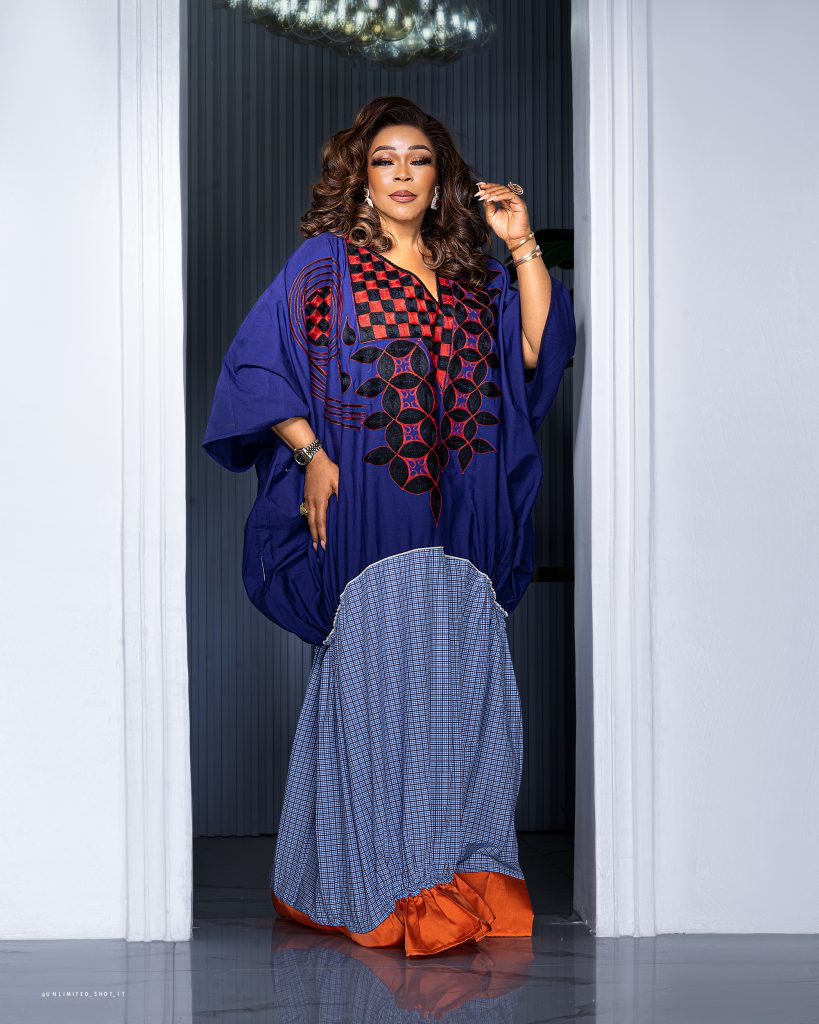
How do you handle the pressure of being a public figure, balancing your career with personal life?
I believe in a higher power. I don’t just operate in a physical form. I believe I’m a spiritual being living in a physical body. So because of that, I do not do anything on my own. I tap into a spiritual power. And my form of referencing that higher power is I say that I am a Christian who believes in Jesus Christ. Therefore, through that, I don’t make decisions on my own, and because of that, I walk in a knowledge of I have to be better, do better, and be a better, higher version of myself daily. When I walk into a space, I must acknowledge and know that this person is different. I operate that way in everything that I do. Decisions are not just made with me just feeling, oh, I’m just going to make this decision. I tap into my higher power, and I am guided. Now, because of that, I try to get people to realise that I don’t make the mistake. Because of that, God gave me a brain. I use it. I work very hard. I’ve been very consistent. I am a person of integrity. And because of that, doors open. People want to be in business with me. And when I say business, I mean the entertainment, I mean the influencing, everything that I do, MCing, speaking engagement.
People want to do business with me because there is a positive energy around me. And that’s how I can balance it because the pressure of living in the world, and especially in Nigeria, is quite high. You cannot do it alone. So I don’t try to do it alone. So because I am guided, because I am given knowledge, and wisdom, by the grace of God, I make the right decisions. And because of integrity and consistency, I attract the right people. Let me put it that way. It’s never easy to take the positive way out all the time. Because what that means is you say no to a lot of business deals. You say no to some things that can enrich you financially. I’ve also learned to say no to some things that just don’t connect with my brand and with my beliefs. But when I do say yes, I realise that this is the reason why God was directing me this way. So, I anchor on a higher power. That’s how I stay balanced.
What are the things that keep you grounded?
I have a son and I have a daughter. My children anchor who I am. That’s also one of the things that keeps me grounded. My children anchor me. I must show them, I must be a light and an example to them always.
How do you unwind after a long day on set or after a particularly challenging role?
So, how do I unwind when I’m not working? I unwind by just dropping everything. I believe very much in taking time for yourself. So I take time out. Sometimes I travel. And it’s not just about travelling. Sometimes, I just take the time off social media. Like right now, if you look through my page, I haven’t posted in about a week. Maybe I’ll do a story here and there. But I haven’t posted. And that’s because sometimes I just feel like the energy there is very negative. So I retract, and I just concentrate on the things around me. The positive things around me. The air around me. Just sitting in a place, drinking a cup of coffee with a journal in your hand. And just being present with nature. Being present with what’s around you. Enjoying the calmness. I don’t want people to think that you must have money, you must travel, you must be affluent to be able to enjoy things. No. Sometimes, I don’t travel, and I still have that Zen. I make my home as comfortable as possible. I can be in my house for three days just reverencing God and just being present and restoring what I have put out. Because in what I do, you put out a lot of energy, and you have to get restored. So I go to a place where I restore. Then I have friends and family that I start to connect back with. Because as an actor, you stay so busy. I’m an actor. I’m a speaker. I am an influencer. That takes a lot of energy from you. So, to restore that, I shut down all of that. And I start to connect with the people that love me and matter to me. Those are the times I connect with them. I talk to them. I make phone calls. We laugh. They put back into me those things, the energy that I have exhausted.
What’s one piece of advice you would give to your younger self starting in the industry?
Be patient. You are going to get to that place where you now see why you were patient, and things were the way they are. You have to be hardworking. And you have to be consistent. And in hardworking, I would say to you, my younger self, drop your phone sometimes. And if you have to pick up your phone, use it for something positive. Instead of scrolling through TikTok and Instagram, go to YouTube and study acting. Study the entertainment field. Study the business of it. Study the influencing part of it. Study the reason why you need an Instagram page as an actor. Study the reason why you need to read your script as an actor. Study the reason why character bibles are important. Go to YouTube and study Acting 101. Click it in there and use your data. Use that data positively. Study, study, study. Practice, practice, practice. Go to auditions. Be the first person there. Be consistent. Be good at what you do. This industry is no longer looking for quantity. They are looking for quality. How good are you when you step into a room, and you give an audition piece? Will they remember you? Those are the questions you need to ask yourself. If you want this, don’t want it for popularity, want it because this is what your heart yearns for. And this is what you want to do. Because if you’re doing it for the wrong reasons, you are going to be exhausted. So be consistent. Work hard and pray.
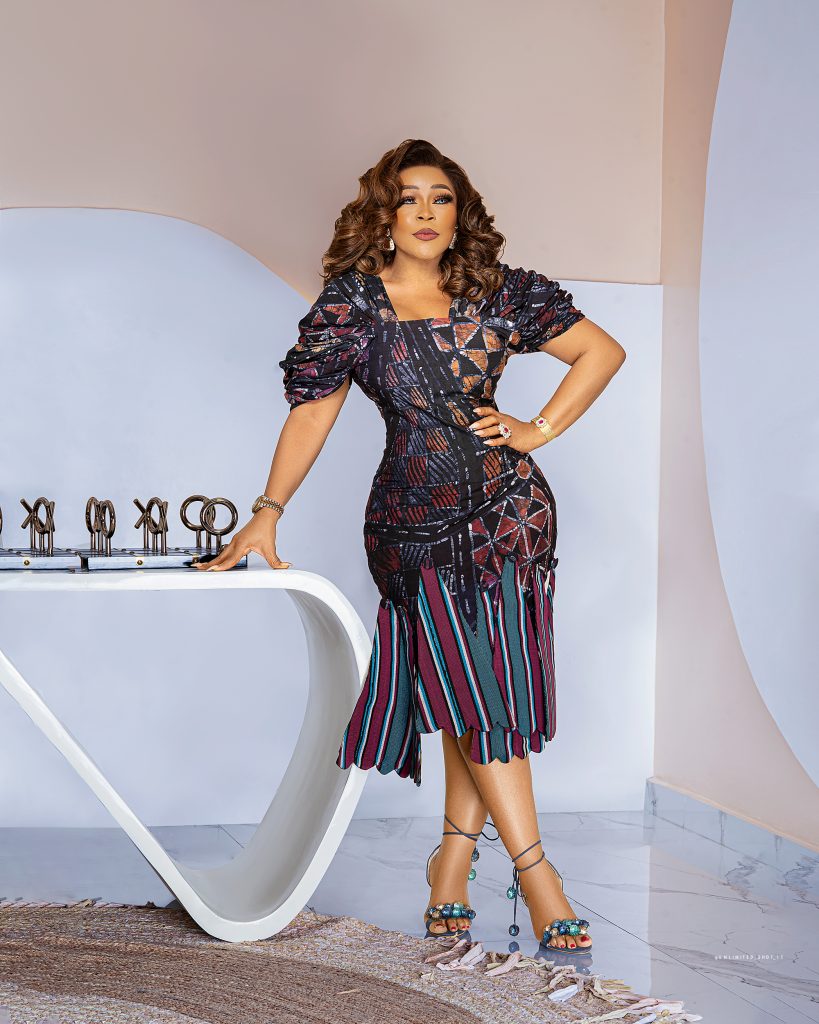
Having been in the industry for years, how would you say Nollywood has evolved throughout your career?
Nollywood has evolved tremendously. That question for me, everybody can answer it. People say it all the time. It’s grown. Whatever it is that we’re doing in life, we expect that, at some point, it will grow. Those are the legends of this industry. I give them kudos because they went through a whole lot.
They opened doors and channels for us with their sweat and hard work that we are now enjoying. When you start something from the beginning, there’s no money in it. You just do it for the sacrifice and for the love of it. It’s almost like a new actor coming in. You put in the sweat. Those who are our true legends and icons put in the hard work and the sweat. And by the grace of God, some of them are enjoying it now. Look at someone like Mama G, Mama Patience Ozokwor. They put in a lot of hard work. And thankfully, I am grateful that people like that are now enjoying and reaping that. Although some are not fortunate enough to do so. If you go back to the movies that they were shooting then it was the basics. But look at where we are now and, of course, the streaming platforms that came and changed everything, that also made the industry evolve, and the business aspect of it has evolved. So, a lot of things about the industry have evolved; it just makes sense that everything about it has transformed. I often say that Nollywood is about quality and not quantity anymore. What do you bring to the table? And yes, I said it; what do you bring to the table is now part of the question and is something you must be able to answer. We are now in an era of social media, that also transitioned the industry. Now you have the likes of influencers becoming actors because innately that’s probably why they started influencing, to get recognised and that has evolved them into being in films. So a lot of things happened, and we have a lot of opportunities to come into the industry now. So, it has evolved because life itself is about change. In your view, what do you think the Nigerian film industry needs to improve to compete on a global scale.
We need to continue telling our stories. We’ve been doing it, but we need to continue telling our stories authentically. No one can tell our stories like we can. Nigerian women, either Igbo, Hausa, or Yoruba their nuances are so different. When we hear a Yoruba woman speak, we can sort of tell. When we hear an Igbo woman speak or a Hausa woman, we can tell. So when an international actor takes on our role, we know the differences. Other people around the world may not see it, but we can see it, and we can tell if some of the nuances are not there. So, we need to just keep going by telling our stories. So, I believe that if we keep doing that, we would just keep evolving.
What is a typical day like for Shaffy Bello when you’re not on set?
I would wake up any time I please without any alarm. That in itself is a blessing. So when I do, I use the time well. I wake up, I say my prayers, get my word in to give myself the daily bread, and then I speak good things into my life; I always do that every day, though. That’s a daily practice. But when I am not working, I think the most beautiful part is being able to wake up without an alarm. I get to do whatever it is I want to do. I check in with my home. I mean the things I don’t normally do at home, like cleaning things up and getting things situated, because I love it when things are the way they ought to be. Those are the times that I make phone calls. I try not to do work during those periods.
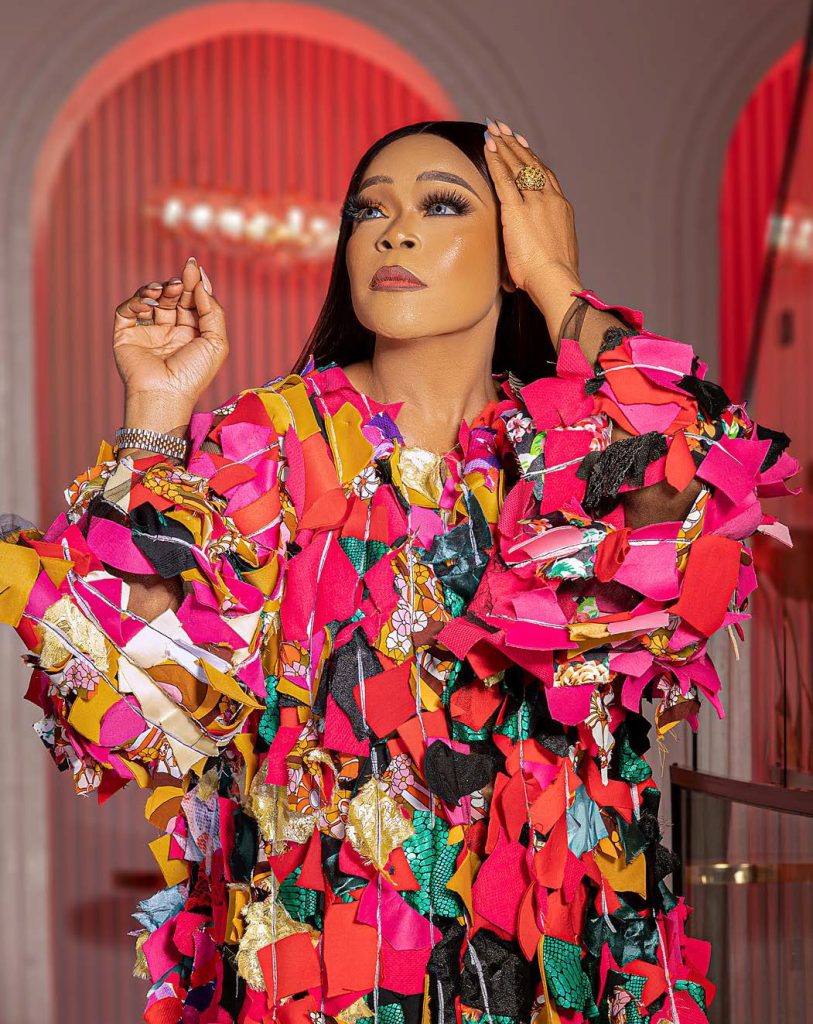
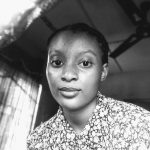
Dorcas Akintoye is a versatile writer with a passion for beauty, fashion, relationships, and culinary delight. With a keen eye for detail and a passion for storytelling, she adds a touch of elegance to every topic she explores. She is a writer at THEWILL DOWNTOWN.




